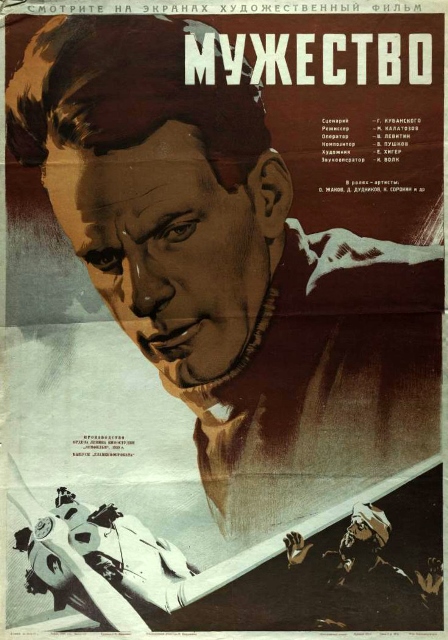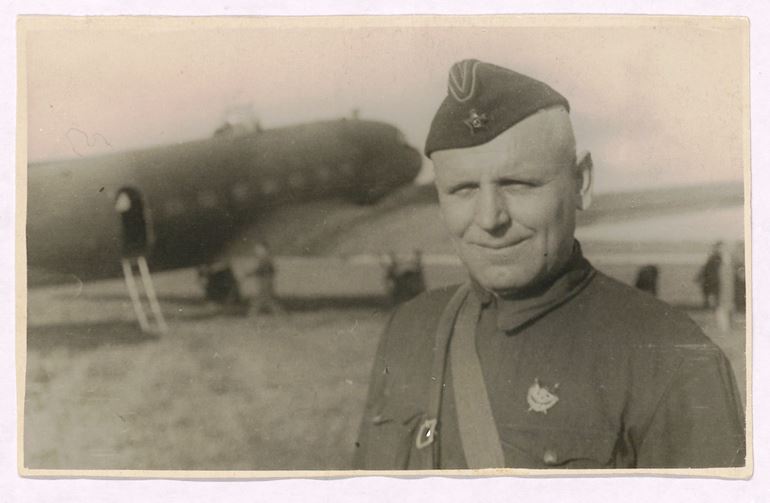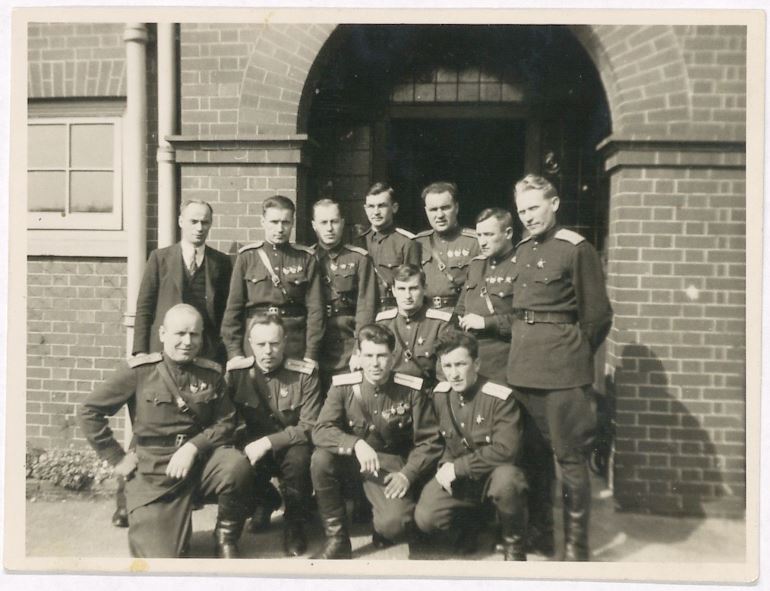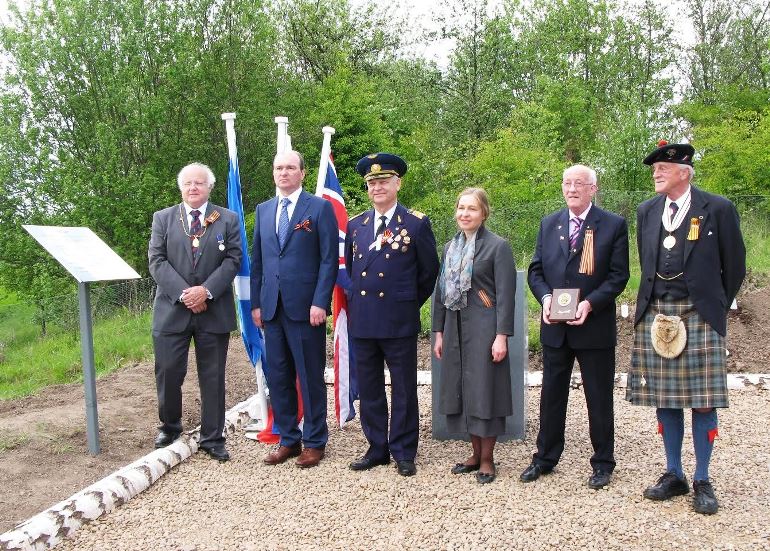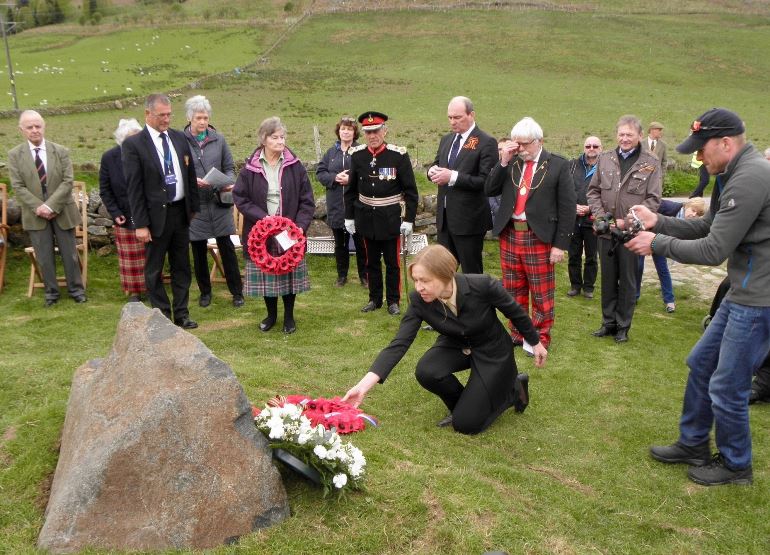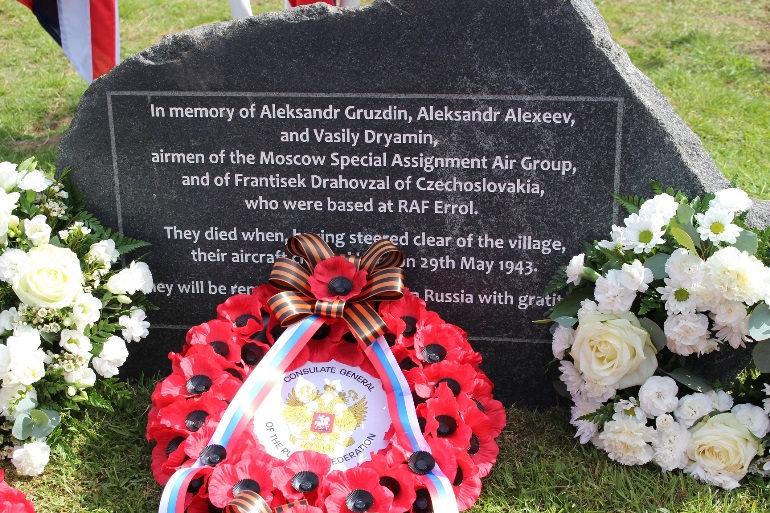Sergey Vinogradov
Special Assignment Airmen, a book by Anna Belorusova, a Russian writer, will be the basis for the exhibition planned at the British town of Bournemouth on the shore of the English Channel. The book tells about the Soviet Airgroup of ace-pilots and the Soviet-British allied cooperation during World War II.
Looking for information about her grandfather, the pilot Pyotr Kolesnikov, Anna Belorusova could not ignore the discovered facts and forgotten names which resulted in a book reminding about the Soviet-British allied brotherhood. The developments were unexpected: the publication initiated a number of commemoration events in tribute to Soviet airmen. Diplomats, British veterans, government officials and local residents take part in the events. And in 2020 they plan to open a memorial to the Soviet airmen in Scotland.
The book’s author told the Russkiy Mir of unexplored facts of history that she had been able to shed light on while working in Russian and British archives, and that there is the great interest to in the UK to the history of Soviet-British allied cooperation during World War II.
Special Assignment Airmen, a book by Anna Belorusova
Family history
– What was the starting point of your research?
– In the very beginning it was a family matter. I wanted to know more about my grandfather, Pyotr Ivanovich Kolesnikov. Before the war, he used to be a pilot-in-command of Douglas PS-84, a passenger airliner, and he participated in the production of Mikhail Kalatozov’s first film about Soviet airmen. I did not meet my grandfather, he died in 1948 at the age of 42 - his heart was affected by tensions of the war years, but he was often spoken about in our family. For example, how he visited the UK during the war. It was a kind of family legend - the grandfather had travelled to England for the planes "presented by the king." I started searching for information about him based on some scraps of my mother’s vague childhood memories, the map of the British Isles with obscure marks made by my grandfather, a set of old postcards and English grammar books with the following inscription: “Good luck and may you visit England again under better conditions. Russia & England - V!”
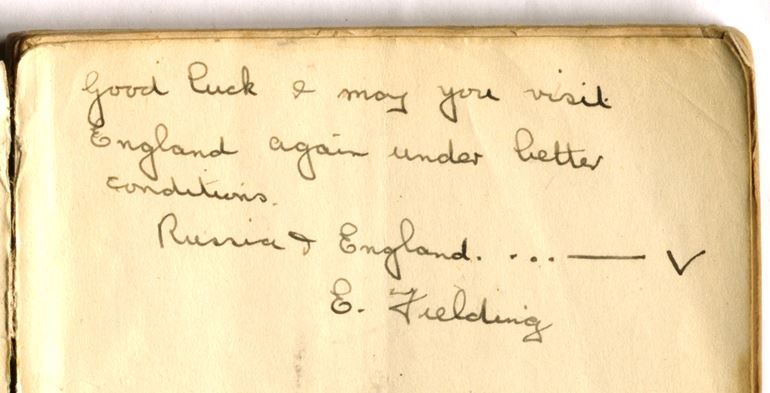
Inscription in Pyotr Kolesnikov’s English grammar book. Anna Belorusova’s archive
– You mentioned a Mikhail Kalatozov’s film. How did your grandfather take part in its production?
– Before the war, he was a civil aviation pilot, and he was invited to production of Courage as a consultant and a pilot of the airplane, from which the footage was captured. The film was produced for the All-Union Aviation Day in 1939. Back then capturing scenes in air, from the aircraft, was an innovation; that is way the film marked a milestone in Soviet cinematography. According to its story, the main character of the film, whose role was played by Oleg Zhakov, defeated an armed bandit, who had hijacked the airplane, performing mind-boggling banking of aerobatics.
The director of the film, Mikhail Kalatozov, used the story of Vasily Koliukh, a pilot and my grandfather’s close friend, as the basis. Aerobatics scenes over the Caucasus Mountains were filmed from the plane of Pyotr Kolesnikov, who knew the mountains well due to many years of flight work in the Transcaucasus. The film became an anthem to courage of Soviet pilots and predetermined many fates of the pre-war generation that dreamt about aviation.
Courage. The Poster for the film, 1939. Photo credit: kinopoisk.ru
Special Assignment Airmen
– Your book about the grandfather and his comrade-in-arms is called “The Special Assignment Airmen”. Tell us please about this special work of theirs.
– The Moscow Special Assignment Air Group was formed on June 27, 1941 for performance of top importance missions of the Supreme High Command of the Red Army. The best crews of the "crème-de-la- crème" of the Soviet civil aviation were handpicked for the Air Group. The Vnukovo aerodrome located near Moscow became its home base. From the first days of the war, Douglas passenger aircrafts loaded with ammunition supplies, tank fuel, and medications flew to front lines of the fierce battles and evacuated the wounded on the way back.
Operational record of the Air Group comprises of milestones of the first, the hardest period of the war before the Battle of Stalingrad which changed the course of the war: the Defense of Moscow, supplying food to besieged Leningrad in the fall and winter of 1941, dropping of airborne troops and ammunition to the Soviet armies in enemy encirclement near Vyazma and Rzhev, evacuating the wounded during last days of the Defense of Sevastopol in June 1942, flights to the deep rear of the enemy with parachute reconnaissance groups and landing at the first partisan aerodromes in Smolensk and Belarusian woods. I was able to restore the operational records of the Moscow Special Assignment Air Group on the pages of the book based on archival records.
Pyotr Ivanovich Kolesnikov. May 1942. Anna Belorusova’s archive
– Have you been able to cope with the task set in the beginning of your research, i.e. to know more about your grandfather?
– Absolutely. He took part in all the operations mentioned above. In April 1942, he was able to track down in the darkness of woods the last surviving group of the 33rd Army of General Yefremov almost completely destroyed by the Germans. So for several nights he was dropping ammunition and food until 700 soldiers came out to their fellow troops. In June 1942, his plane was the first to pave the night air route across the Black Sea for the Sevastopol operation to evacuate the wounded from the besieged city.
Military brotherhood
– How did this search lead you to the UK?
– It happened when I found out that at the beginning of 1943 the most experienced crews were selected for a secret allied mission - to test and ferry twin-engined Albemarle bombers to Vnukovo. The British government handed over the bombers for transportation operations on the Eastern Front. The history of Soviet airmen staying in the UK as part of the 305 Air Unit of the Royal Air Force turned out to be one of unexplored facts of the World War II; and there are no evidences of it left.
I was able to restore this forgotten page of the World War II for the first time based on materials from archives in Russia and the UK. It was the National Archives in London where I found the Operations Record Book of the 305 RAF Air Unit, which was based at the Errol military aerodrome in the east of Scotland. It was a large air station, where training was provided for pilots from all countries of the anti-Hitler coalition - Great Britain, Canada, New Zealand, the USA, as well as Czechs, Poles, volunteers from the Free France liberation movement.
The Soviet airmen in the Great Britain. Pyotr Kolesnikov in on the left in the 1st row.–. March 1943. Anna Belorusova’s archive
The Soviet air unit entered this multinational community. Working in the Moscow archives, I managed to find a detailed report on the special mission to Britain written by its commander, Veniamin Korotkov. It is a look at life in the UK during the Second World War through the eyes of Soviet airmen who were welcomed everywhere as real heroes embodying a hope for the coming victory.
– While working on the book and after its release, you visited British archives and also met with officials, army men and local residents. Today, when relations between Russia and the Great Britain are far from being the partner ones, are the British people interested in the allied brotherhood of the World War II? What impression did you get?
– The interest is really big. I can say without any doubt that all our memorial and educational events attracted a lot of attention. Memory of the mysterious Russian air unit based in Scotland had remained only at the level of legends; and the fact that 70 years later a granddaughter of one of the airmen arrived with documented evidences caused an incredible response. It turned out that for the last few years, while I was working on my book about the lives of my grandfather and his comrade-in-arms, at the same time I was creating and adding a new chapter of contemporary history, all together with the Scottish people.
In May 2015 we opened an exhibition at the Montrose Air Station museum, the oldest aerodrome in Britain with a hundred-year history. The exhibition was dedicated to the history of the Soviet air unit and allied relations of two countries. The interest of visitors surpassed all expectations - after two years, the expanded “Russian exhibition” took the premises of its own and became a permanent section of the museum. Many people have actually discovered this theme for the first time; some visitors admitted they had not known that during the Second World War the USSR and the Great Britain were allies.
At the same time, in May 2015, commemorating the 70th anniversary of the Victory, a memorial plaque was unveiled at the former RAF Errol aerodrome. It was placed right where one of the runways starts, and since then a solemn wreath-laying ceremony in memory of Soviet airmen is conducted there on annual basis. This is a memorial place. Bradley Borland, its permanent and voluntary guardian, planted birch trees and chamomiles there. Now this place is known as the “Russian Corner”. Every May, besides officials, the Russian Consul General and representatives of local authorities and ordinary people gather there, and every year their number grows. This year the traditional ceremony was held for the fifth time.
Unveiling of the memorial plaque at the Errol Aerodrome. May 2015
– As of today, the last event was a ceremony in tribute to the Soviet airmen who died in the UK in 1943. How did they die?
– The ceremony in tribute to the Soviet airmen who died in the plane crash on May 29, 1943, was held on May 6 in the village of Fearnan on the shore of Loch Tay. During the flight, the airplane began to fall due to a technical malfunction, but the airmen managed to direct the plane that lost control to a deserted area outside of the residential area, which saved many lives. A memorial stone was installed and an alder tree was planted at the place where Aleksandr Gruzdin, the pilot-in-command, Vasily Dryamin, the radio operator, Aleksandr Alexeev, the flight-engineer, and Frantisek Drahovzal of Czechoslovakia died. The Montrose Air Station Museum created an exhibition about the airmen at the Fearnan Village Hall.
Wreath-laying ceremony in memory of Soviet airmen
Memorial stone at Fearnan village
– Will commemoration of history of Soviet-British allied cooperation continue in the year of the 75th anniversary of the Victory?
– It definitely will. It is planned to conduct several events in the UK in May 2020. They are aimed to commemorate the Soviet air unit in locations where it was based. A memorial to Soviet airmen will be created at the Errol airfield in Scotland, the site of the annual celebrations.
Based of materials collected in my book, an exhibition will be organized at the Central Library of Bournemouth. It will be dedicated to the history of combat operations of the Moscow Special Assignment Air Group on the Eastern Front and to the allied mission of the pilots.


